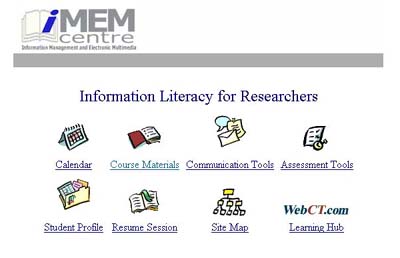
 |
Information Literacy for Researchers Virtual Classroom |
| Department of Library & Information Studies |
|

|
|||||||||||
| Information
Literacy for Researchers Virtual Classroom
Mrs Wendy Gordon and Dr Graham Stewart, iMEM Centre, Department of Library and Information Studies, M.L. Sultan Technikon. 19 October 2000. IntroductionThe
project originated in the context of a larger undertaking, commissioned by
the National Research Foundation (NRF) Division for Social Sciences and
Humanities (DSSH) aimed at producing several modules for staff research
capacity building at technikons. The development of literature review
writing skills within a virtual classroom environment constitutes the
Information Literacy module of the DSSH programme. The course begins with
training in the analysis of information needs and sources, and then goes
on to address information retrieval and organisation. Finally, the course
focuses on the integration of retrieved information into a coherent piece
of academic discourse: the literature review The learning path1.
Analysis of information needs and sources Theoretical frameworkWhile the virtual classroom is an ideal student-centred learning space, our authoring criteria were also influenced by the notion of “knowledge-centred” learning (Bransford, Brown and Cocking, 1999). To encourage thinking, problem-solving and reflection, the learning experience needs to take place in “… well-organized bodies of knowledge that support planning and strategic thinking.” The learning path (Sections 1-3. above) and the individual subsections present a coherent content framework intended to foster “inquiry, including critical thinking, problem solving, decision making, and communication at increasing levels of complexity.” (National Science Foundation, 2000). Content structureBasic
elements included in the authoring of each section were: Project development pathThe
project development process included the following steps: The way forwardThe
theoretical and developmental basis of this module is student-centred,
collaborative learning. A virtual classroom combines a high level of
interaction and collaboration amongst participants with direct access to
the resources of the Internet, underscoring its appropriateness as a
medium for training in information literacy. A virtual classroom is
uniquely suited to the growing need for learners to develop information
literacy skills. For a start, the virtual environment pre-supposes a basic
level of computer literacy, which is an essential prerequisite for
research. The technikon researchers that constitute the primary target
group of this project all have access to the necessary IT equipment and
software thanks to the success of the UNINET project (“… provid[ing] a
computer network that works to the standards of the Internet, for the use
of every academic, researcher and student in South Africa.” FRD, 1997).
The expectation that researchers should now be IT literate is evidenced by
the South African National Research Foundation’s requirement that all
research proposals have to be submitted online. List of referencesBransford,
J. D., Brown, A. L., & Cocking, R. R. 1999. Chapter 6: The design of
learning environments. How people learn: brain, mind, experience, and
school. Washington, DC: National Academy Press. |